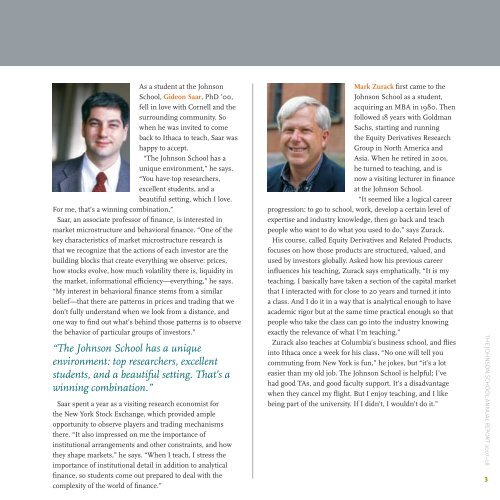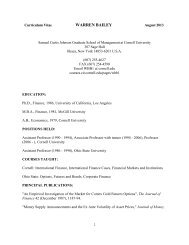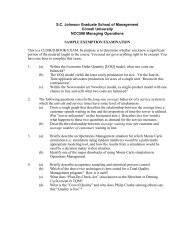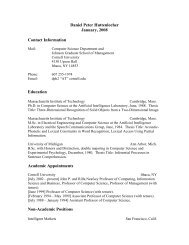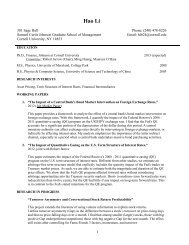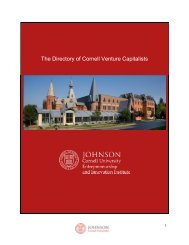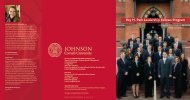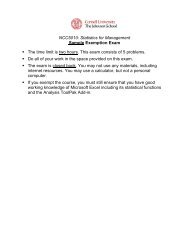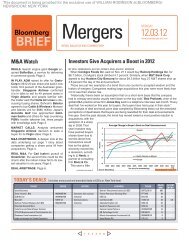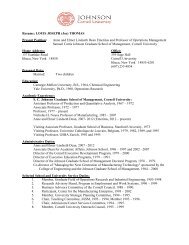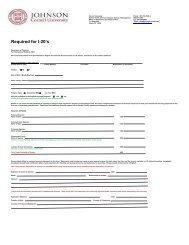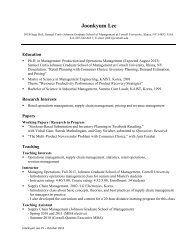The Johnson School Annual Report 2007–2008 - Johnson Graduate ...
The Johnson School Annual Report 2007–2008 - Johnson Graduate ...
The Johnson School Annual Report 2007–2008 - Johnson Graduate ...
You also want an ePaper? Increase the reach of your titles
YUMPU automatically turns print PDFs into web optimized ePapers that Google loves.
As a student at the <strong>Johnson</strong><br />
<strong>School</strong>, Gideon Saar, PhD ’00,<br />
fell in love with Cornell and the<br />
surrounding community. So<br />
when he was invited to come<br />
back to Ithaca to teach, Saar was<br />
happy to accept.<br />
“<strong>The</strong> <strong>Johnson</strong> <strong>School</strong> has a<br />
unique environment,” he says.<br />
“You have top researchers,<br />
excellent students, and a<br />
beautiful setting, which I love.<br />
For me, that’s a winning combination.”<br />
Saar, an associate professor of finance, is interested in<br />
market microstructure and behavioral finance. “One of the<br />
key characteristics of market microstructure research is<br />
that we recognize that the actions of each investor are the<br />
building blocks that create everything we observe: prices,<br />
how stocks evolve, how much volatility there is, liquidity in<br />
the market, informational efficiency—everything,” he says.<br />
“My interest in behavioral finance stems from a similar<br />
belief—that there are patterns in prices and trading that we<br />
don’t fully understand when we look from a distance, and<br />
one way to find out what’s behind those patterns is to observe<br />
the behavior of particular groups of investors.”<br />
“<strong>The</strong> <strong>Johnson</strong> <strong>School</strong> has a unique<br />
environment: top researchers, excellent<br />
students, and a beautiful setting. That’s a<br />
winning combination.”<br />
Saar spent a year as a visiting research economist for<br />
the New York Stock Exchange, which provided ample<br />
opportunity to observe players and trading mechanisms<br />
there. “It also impressed on me the importance of<br />
institutional arrangements and other constraints, and how<br />
they shape markets,” he says. “When I teach, I stress the<br />
importance of institutional detail in addition to analytical<br />
finance, so students come out prepared to deal with the<br />
complexity of the world of finance.”<br />
Mark Zurack first came to the<br />
<strong>Johnson</strong> <strong>School</strong> as a student,<br />
acquiring an MBA in 1980. <strong>The</strong>n<br />
followed 18 years with Goldman<br />
Sachs, starting and running<br />
the Equity Derivatives Research<br />
Group in North America and<br />
Asia. When he retired in 2001,<br />
he turned to teaching, and is<br />
now a visiting lecturer in finance<br />
at the <strong>Johnson</strong> <strong>School</strong>.<br />
“It seemed like a logical career<br />
progression: to go to school, work, develop a certain level of<br />
expertise and industry knowledge, then go back and teach<br />
people who want to do what you used to do,” says Zurack.<br />
His course, called Equity Derivatives and Related Products,<br />
focuses on how those products are structured, valued, and<br />
used by investors globally. Asked how his previous career<br />
influences his teaching, Zurack says emphatically, “It is my<br />
teaching. I basically have taken a section of the capital market<br />
that I interacted with for close to 20 years and turned it into<br />
a class. And I do it in a way that is analytical enough to have<br />
academic rigor but at the same time practical enough so that<br />
people who take the class can go into the industry knowing<br />
exactly the relevance of what I’m teaching.”<br />
Zurack also teaches at Columbia’s business school, and flies<br />
into Ithaca once a week for his class. “No one will tell you<br />
commuting from New York is fun,” he jokes, but “it’s a lot<br />
easier than my old job. <strong>The</strong> <strong>Johnson</strong> <strong>School</strong> is helpful; I’ve<br />
had good TAs, and good faculty support. It’s a disadvantage<br />
when they cancel my flight. But I enjoy teaching, and I like<br />
being part of the university. If I didn’t, I wouldn’t do it.”<br />
THE JOHNSON SCHOOL ANNUAL REPORT 2007–08<br />
3


